This is the first time when they have been published in their entirety with full transcript in both Russian and English.
Notebook 1 (12 sheets)
Notebook 2 (brown cover)
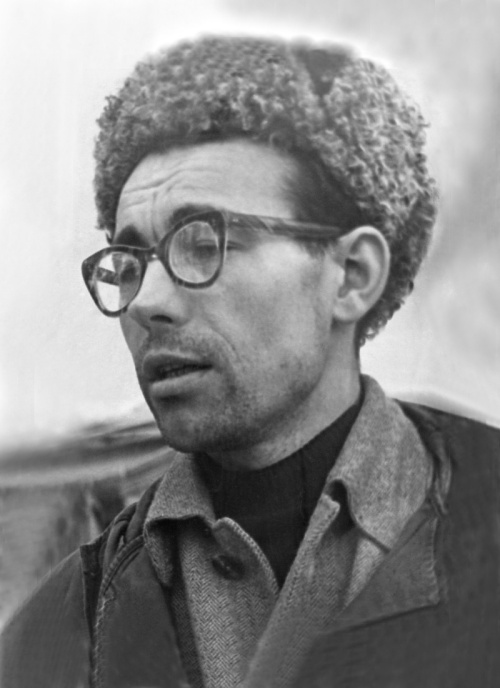
Evgeniy Polikarpovich Maslennikov
Evgeniy Polikarpovich Maslennikov (1924-1978) Master of Sports, Head of the UPI sports club, leading the search operation in 1959. Graduated from the Faculty of Mathematics of the Ural Polytechnic Institute, PhD. One of the first masters of sport hiking in Urals. On his name are called high mountain peak in the Northern Urals. He is the co-author of several books on the hiking routes of the Urals.
Main publications:
- Weekend routes around Sverdlovsk / E. P. Maslennikov, R. B. Rubel
(Маршруты выходного дня по окрестностям Свердловска)
- Routes of the Middle Urals / E. P. Maslennikov, P. I. Istomin
(Mаршруты Среднего Урала)
- Along Middle Urals / R. B. Rubel, E. P. Maslennikov
(По Среднему Уралу)
- Travels in the Urals / R. B. Rubel, E. P. Maslennikov
(Путешествия по Уралу)
- Ural - a tourist country: Guide / E. P. Maslennikov, P. I. Istomin
(Урал - туристская страна: Путеводитель)
Maslennikov's notebooks were not part of the criminal case. They have never been looked at during the investigation.
6 months after Maslennikov's death his widow handed the notebooks to Karelin. They are in his possession to this day.

Vladislav Georgievich Karelin
Vladislav Georgievich Karelin (born 1932) in 1959 UPI student, leader of a rescue group 25-Feb-1959 dropped off on Kholat Syakhl, he and soldiers from Lt. Potapov group found with their probes the body of Slobodin on 5-Mar-1959.
Here is his story, how he got involved in the case. Karelin group finished a trek to Mount Molebny Kamen from 9 to 24 Feb 1959. They started in the area of the upper sources Nyols river towards Mount Sampalchakhl 910 where Dyatlov group was supposed to end their trek at the same time. Both groups had discussed meeting near Oykachakhl 1322. When Dyatlov was a no show Karelin didn't made big deal of it and they continued their way. Two weeks later 25 Feb 1959 in a dining room at the train station of Serov city a man, calling himself a representative of Northern geological party, approached the hikers and asked casually "Aren't they searching for you?" They answered warily "What do you mean search? We are not due yet." They called hastily Sverdlovsk and learned from Orlov about the missing Dyatlov group. They were summoned to participate in the search operation. Two of the members, Goryachko and Granin, were in no shape to continue and were sent back to Sverdlovsk. The other six members: Vladislav Karelin, Georgiy Atmanaki, Boris Borisov, Evgeniy Serdityh, Vladimir Skutin and Vladimir Shavkunov joined the rescuers in Ivdel by train same day.
Back to the notebook in hand. It is not a diary, but the entries and radiograms are dated. Some are out or order, some are not present in the case files, no difference here as anything about this case - confusing and dubious. Not clear if intentionally or because of stress and harsh environment. It is a very interesting reading about the way search was executed, the moral climate and how time and findings affected the rescue members. Also the reaction of the leaders. Do you see any traces of cover up or attempts to obstruct the search or hide evidence? Don't just read other people's opinion, make up your own mind. Here are the writings of the man who lead the search. It's a good start. I will give you some pointers that I found interesting while reading.
WHAT HAPPENED TO THE ORIGINAL EVENING OTORTEN?
The original is not in the criminal case. Moreover, none of the searchers saw it in the tent. Maslennikov did not see the flyer in the tent himself. On 4.III (can be seen on previous page of the notebook) Pavlov radiograms from Ivdel to Maslennikov (who is on the pass leading the search operation): A satirical flyer was found "evening otorten" dated by Dyatlov group February 1. This radiogram is also not in the case files.
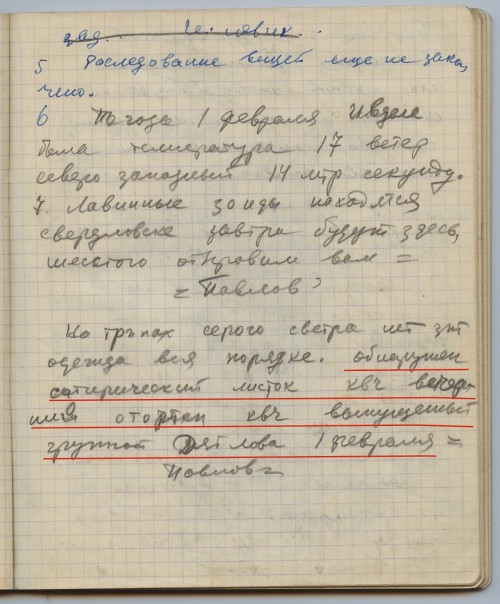
Radiogram from Ivdel on 4 Mar 1959
Only pilot Potyazhenko remembered that he had seen Evening Otorten in the tent. Most likely he took the searches plan for Dyatlov group's flyer. No one else remembers seeing Evening Otorten on the pass.
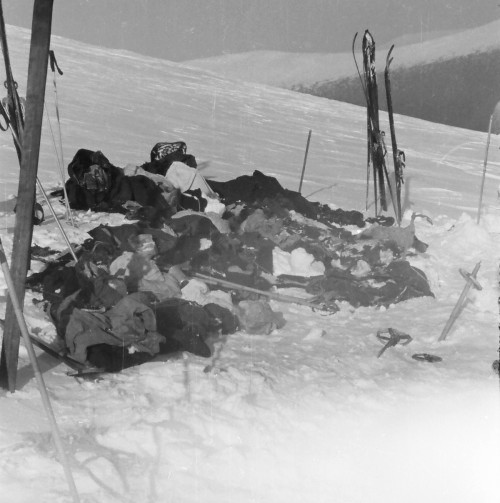
Items from Dyatlov tent, somewhere here is Evening Otorten
Judging by the testimonies most likely the satirical flyer went into the backpack with small items gathered around the tent, hauled to the helipad, transported on 3 Mar 1959 to Ivdel, then the items were taken out and Pavlov sent the message noted in Maslennikov’s notebook on 4 Mar 1959. On that same page it says under 5. Investigation of items is not over.
Protocol inspection of items found at the scene
(Until this moment the search party members had the items randomly put in their backpacks) Scan
Atmanaki witness testimony - page 214 back
All remained undisturbed except for one backpack in which small things were gathered around the tent. Scan
page 215
...everything was packed in a backpack, except for the diary and documents sent to the base camp Scan
E. P. Maslennikov witness testimony
When the inspection was over the tent was dragged to the helipad at a distance of 600-700. Scan
It is believed that after inspection, items from the tent were put back into the tent and all were dragged to the helipad and lifted on 3 Mar 1959.
Why was Evening Otorten typed for the case files and nobody seen the original? Was it because it was falling apart from humidity? Could be, but most likely the reason for the retyping of the Evening Otorten is the same for the group diary and the unknown diary that were included in the case file and what that reason is will remain unknown.
WHERE ARE THE DIARIES NOW?
We are discussing this here because Maslennikov most probably didn’t see “Evening Otorten” but saw the diaries. He copied some of the entries in his 2nd notebook. The diaries that the prosecutor took away contained more records. The group diary ends with Dyatlov’s entry from 31/I, the unknown diary ends on 30/I. The originals of these two have never been published, only typed copies. The rest of the diaries were given back to the relatives and eventually ended up in Dyatlov foundation.
Kolmogorova - last entry from 30/II (obviously a typo in the month)
Dubinina - last entry from 28/I
Slobodin - he didn’t really write much
Yudin - last entry from 27/I, he turned back on the 28/I
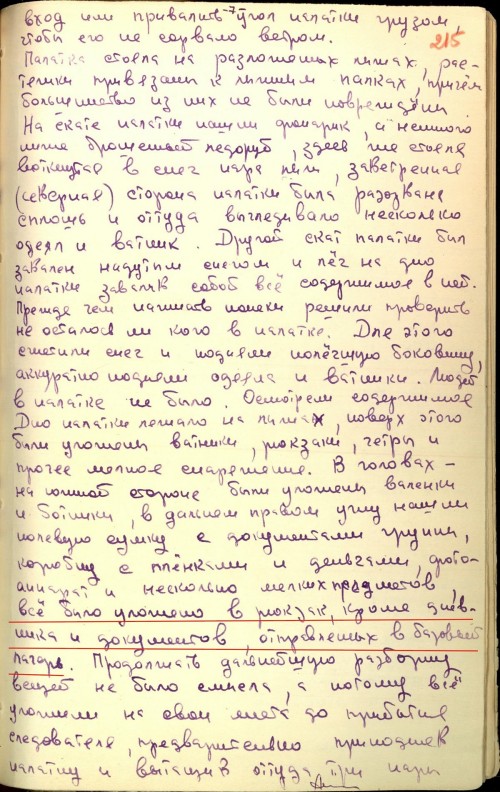
Atmanaki witness testimony
Atmanaki witness testimony
...everything was packed in a backpack, except for the diary and documents sent to the base camp
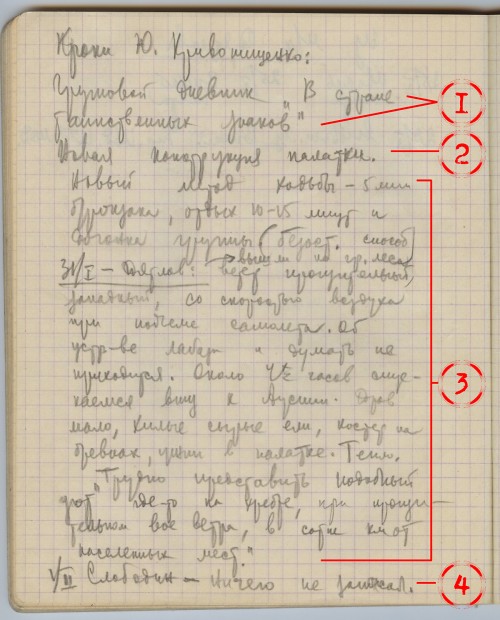
Maslennikov making notes while looking through Dyatlov documents and diaries
- Group diary "In the country of mysterious signs". Unknown diary
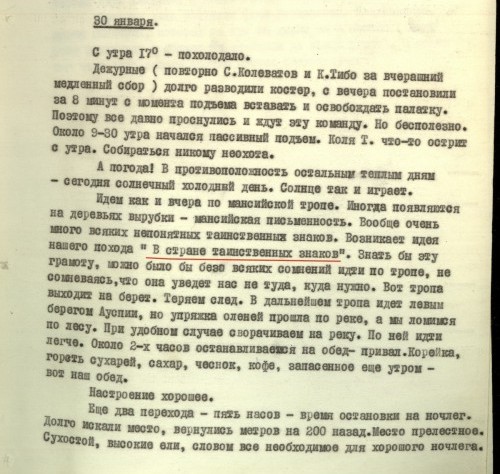
Unknown diary
- New tent construction. Dyatlov group diary
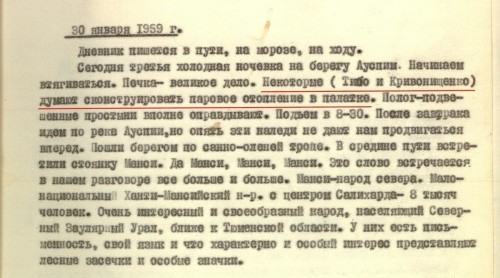
Dyatlov group diary
- New method of walking - 5 min w/o backpack, rest 10-15 minutes and catch up the group (nonstop method)
31/I - Dyatlov: we came out of the tree line. Wind is western, penetrating, with a speed similar to the air draft created by a taking off airplane. I can't even start thinking of setting up a storage. It's close to 4 we are going down Auspiya river. Not enough firewood, frail damp firs, started fire with logs, supper in the tent. Warm. "It is hard to imagine such a comfort somewhere on the ridge, with a piercing wind, hundreds kilometers away from human settlements.”
Dyatlov group diary
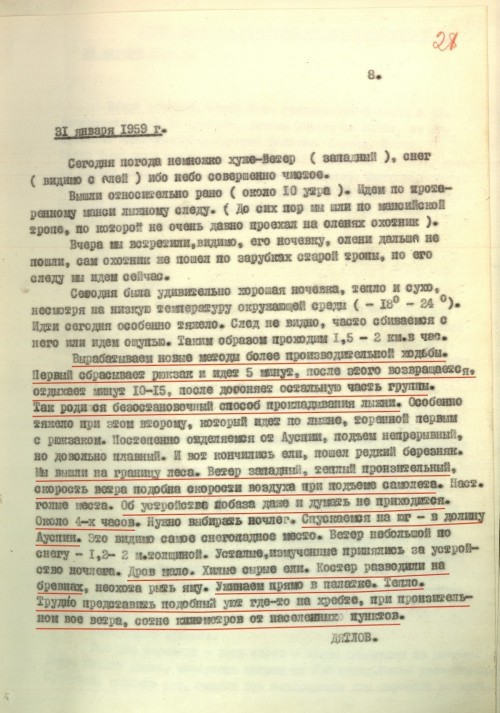
Last entry by Dyatlov in the group diary on 31/I
- 1/II Slobodin - didn't write anything. Slobodin’s diary
MISSING DOCUMENTS
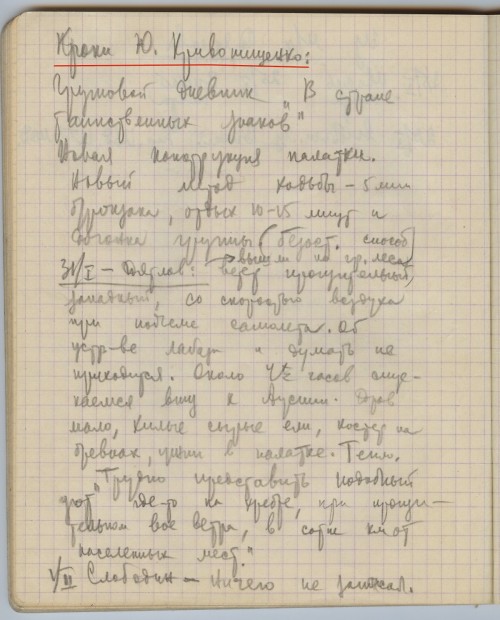
Yuri Krivonischneko topos (schematic drawings of the route)
Topo is a diagram of a mountain with details of routes marked on it. We haven’t seen these topos. Never published.
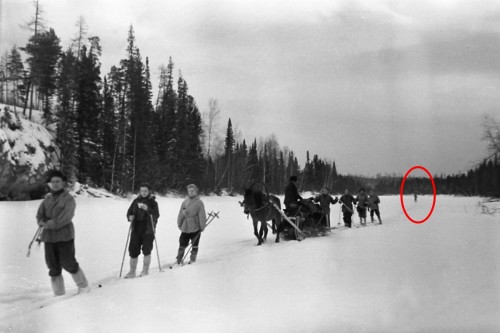
Doroshenko, Zina, Dubinina, uncle Slava Velikyavichus on the sledge, Yudin, Dyatlov, Tibo, Slobodin, and most probably Yuri Krivonischenko in the back drawing topos
Yurka Kri is behind and makes topos of the route. Dyatlov group diary
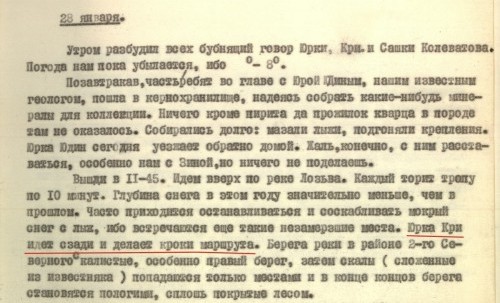
Dyatlov group diary entry for 28/I
HOW WAS TIME OF DEATH ESTABLISHED?
- There is a radiogram from 1/III’59 stating that the date of death is established
The date of the disaster is exactly established to have occurred on the night of February 2nd.
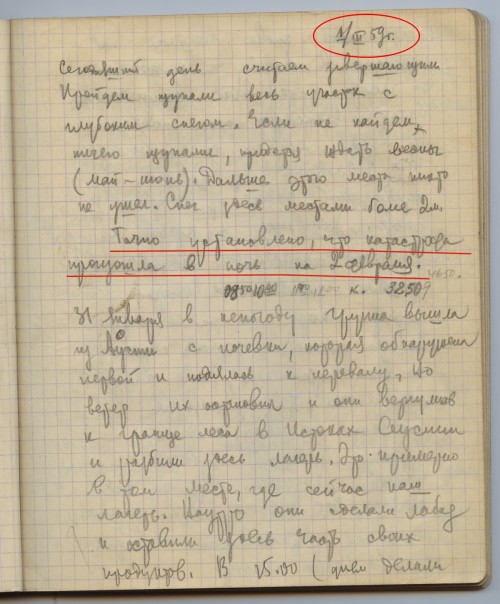
Radiogram from 1/III'59
- On 1/III all the bodies found (4) are still on the pass. They will be lifted off on 3/III.
- On 1/III the tent and all belongings are still on the pass, they will also be lifted off on 3/III.
- The satirical flyer (dated 1/II) will be found among the items from the tent only on 4/III, which coincides with the fact that on the 3/III the items are lifted off, and on 4/III they are taken out and protocoled in Ivdel.
- There are no entries in any of the known diaries after 31/I
On the basis of what, by 1/III, it was precisely established that disaster occurred on the night of February 2nd?
There is also the problem with the sequence of dates of the radiograms the way they follow in both notebooks:
* The date of this radiogram is correct. Same radiogram is in the case files and it was most entered in the investigation most likely from the journal of radiograms in Ivdel, and not from Maslennikov's notebook, which has never been of an interest to the investigation.
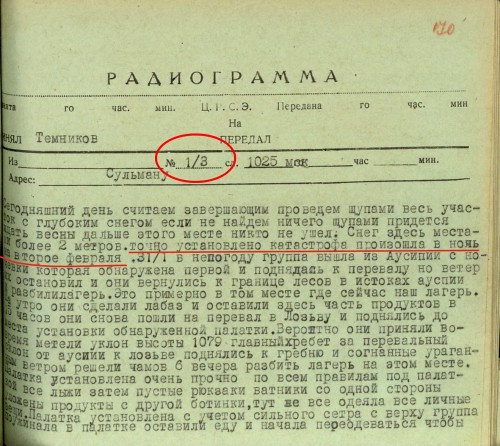
Radiogram dated 1/III from the case files
Apparently notebook 1 ended on 1/III. Notebook 2 could be started leaving blank pages that could be later filled in. This is how older radiograms got before the one dated 1/III. There were two radio operators at the time in the camp - Nevolin and Chernousov, and although Chernousov’s radio was not working, he could be helping Nevolin, hence the radiogram from 2/III inside the back cover on Notebook 1 and not in the new second notebook, which was in the hands of another person at the time. Something like that. The important thing is that we can verify the date on the radiogram marked with * because this is where the time of death is mentioned for the first time in the official investigation.
MONUMENT
It is still 3/III, only Krivonischenko, Doroschenko, Dyatlov and Kolmogorova were found. Maslennikov is planing a monument for the victims and yet Maslennikov is drawing a monument. Isn't it too early to make them martyrs? Monuments are built in recognition of somebodies death not to be in vain. To commemorate. To me it is sad to have a monument before they have found you, and before they figure out why and how one died.
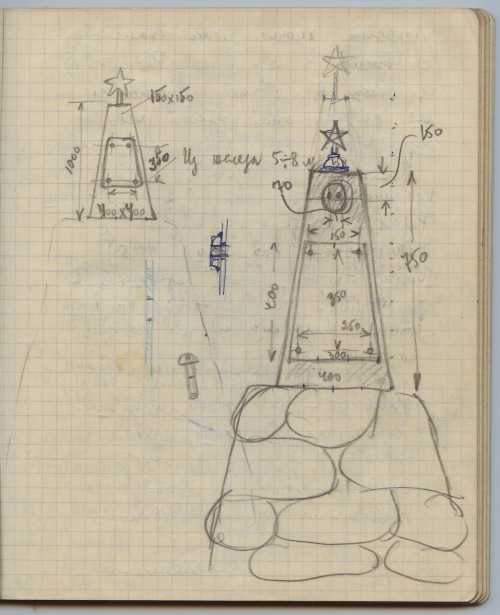
Maslennikov is planing a monument for the victims.
The temporary monument was built in April. When Blinov arrived on 14/IV it was already in the area of the helipad on the pass.
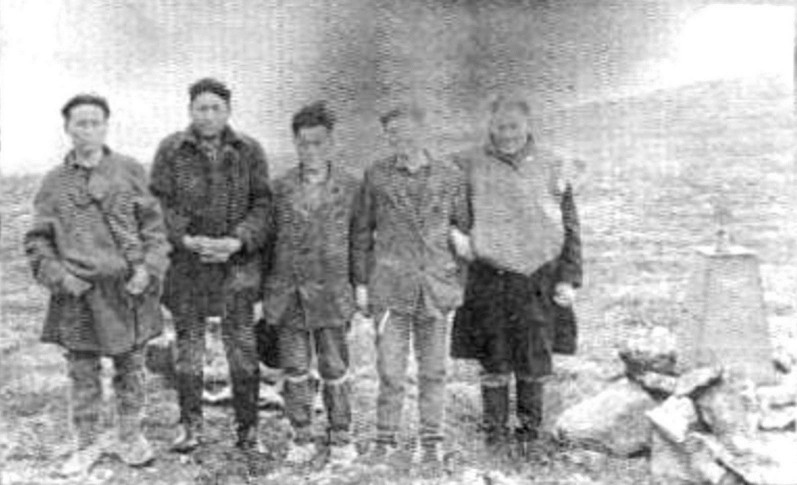
Rescuers, Kurikov to the right and the temporary monument drawn by Masslennikov in his 2nd notebook.
The temporary monument was (re)moved when Yakimenko installed the memorial plaque in 1963.
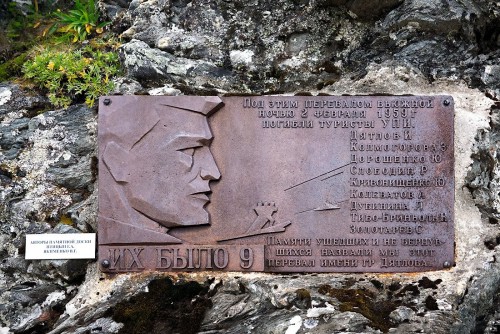
The memorial plaque on the Boot Rock nowadays